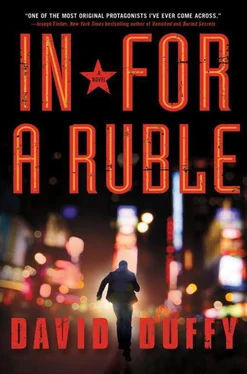“How long have they been going out?”
“I’m not exactly sure. Since the summer, I think. She goes to the same school.”
I nodded. Time to resume the role of heel. “I only have one more question. You mentioned secrets: What’s yours?”
The eyes retreated behind the lenses. The voice took a less friendly tone. “What do you mean by that?”
“You’ve been spending a lot of time with doctors in this part of town.”
“How do you know that?” Her hands clutched her soup bowl. The eyes flashed, angry.
“I know a lot of things I shouldn’t. I’m sorry.” I hoped I sounded sincere.
“How?”
“I just know.”
She thought for moment. “It’s Foos, isn’t it? That data-mining machine of his.”
I nodded.
“Shit. He’s told me about it. I never thought about having it turned on me. What did it tell you? I want to know.”
“It takes data like credit card and phone records and looks for patterns, discrepancies from patterns, things that constitute behavior, things that indicate a change in behavior. So it told me about the calls back and forth with the neurologists. It identified the imaging lab. It reported you’ve been spending a fair amount of time here, at the coffee shop, at the bookstore down the street, at the pharmacy on Second and Sixty-eighth, at the nail salon on the next block. The doctors, they’re self-explanatory. The rest suggests a lot of time waiting, between appointments, between tests, so I’m inferring you’re dealing with some complex medical issues. I’m sorry—both that that’s the case and that I had to find out about it.”
“But it didn’t tell you anything about my exact situation, my diagnosis?”
“No. It has some limitations, fortunately.”
“That’s something, at least. And Foos didn’t say anything?”
She’d confided in him—that surprised me. Then again, maybe not.
“Not a word. And I asked him about you.”
She nodded. “He’s a good friend.”
She raised the soup bowl to her mouth and sipped over the lip. Her eyes stayed on me as she gathered her thoughts. I took a swallow of my coffee. Lukewarm.
“I’ve been diagnosed with ALS. You probably know it as Lou Gehrig’s disease, a degenerative neurological disorder, usually terminal.”
“I know what it is. I’m very sorry.” I felt worse than ever—about her, about what I’d found out, about the whole family.
She seemed to read my mind. “Thank you. And don’t worry—you were doing the job Sebastian asked you to do. I don’t hold anything against you. I just found out for sure a few days ago, and I’ve been keeping it close until I could talk with the doctors about the ramifications and possible treatments. I haven’t told anyone, other than a few friends like Foos. Sebastian doesn’t even know. I’ll tell him tonight, now that I have the full picture. I wanted to know everything I could before… They tell me there are drugs now that can slow the progress… There’s also a chance of remission, a small one. I’m not the usual candidate for this illness either, so…”
“If attitude is anything, you’ve got a great shot.” I meant it. A new mother, she was dealing with the worst kind of death sentence with remarkable equanimity. Most people would have been barely functioning.
“I’m trying to stay positive—as positive as I can under the circumstances. We have money, I’ll have the best care. I’ve determined… I determined we should all lead as normal a life as possible. For as long as possible.” She looked up at the clock on the coffee shop wall. “Speaking of appointments, I’ve got one in ten minutes.”
“Good luck.”
“Thanks. I keep telling myself I’m a lucky person. Everything’ll be fine.”
I watched while she stood carefully and walked down the aisle to the door. She misstepped once ever so slightly, steadying herself on a table before proceeding.
I hoped she was right about being lucky. She was trying hard to believe it.
No call back from Thomas Leitz or Jonathan Stern. I bought an hour on my parking meter and trotted down to the black stone and glass behemoth at Third Avenue and Fifty-sixth Street that housed the headquarters of Marianna’s husband’s company. The lobby guard declined to allow me upstairs. I called Foos for some ammunition, then dialed Stern’s number. His secretary said he was unavailable.
“Please ask Mr. Stern whether he would like to talk to me—now—or whether he would like me to post the following purchases on the Internet, linked to his name.”
I read her the list of lingerie items, each purchased in a different city, all charged to Stern’s corporate American Express card.
“I’m downstairs, I’ll hold on,” I said helpfully.
The woman gulped and went away. Three and half minutes later the guard handed me a building pass, the elevator whisked me to the thirty-third floor, and a good-looking woman in her forties escorted me to a corner office.
A tall man in a striped suit, with fair hair parted in the center and a jutting chin, stood by the window, some papers in his hand. He didn’t offer to introduce himself. The secretary closed the door softly behind her.
“What the hell’s this all about?” Stern said. His voice held neither fear nor anger, just authority. I was a unwanted, unimportant interruption in his day. But not so unimportant that he left me continuing to cool my heels in the lobby.
“The answer to that depends on you,” I said evenly. “You’ve been sleeping with lots of women who aren’t your wife. That’s between you and her, except randy CEOs of public companies make good copy. You’ve also been charging Champagne and lingerie to your corporate credit card. That’s between you and your board of directors. Maybe you’ve been accurate on your expense reports about those charges and nobody cares.”
The hand holding the papers dropped a few inches. Some of the authoritarian veneer fell away. The mood pendulum in the room swung in my direction.
“I don’t give a damn about any of it,” I continued, “except for the leverage it provides. We haven’t been properly introduced, but the one thing you should know is that I was trained by the KGB. We’re very good at using leverage.” I smiled to show it was nothing personal. “Answer my questions, and I’ll leave. Lie, prevaricate, stonewall, and you’ll have many more people asking much more difficult questions by this time tomorrow.”
“Who the hell are you? What do you want?” His voice indicated I’d succeeded in moving up the food chain—from irritant to menace.
“I’m doing a job for your brother-in-law, Sebastian Leitz. That’s all you need to know about me—except that those corporate card charges, they’re only the beginning of what I know about you. You invest in your brother-in-law’s hedge funds?”
“What? Yes. But what the hell…?”
“Then why’d you help bug his computers?”
I was all but certain he hadn’t—he didn’t match the cleaners’ description—but I wanted him on edge when he answered.
“WHAT? What are you talking about? Sebastian? Bugged computers. I have no idea…”
“Okay,” I said calmly. “Sit down. Let’s have a rational conversation.”
He took the chair behind his desk. I sat opposite and made a point of shifting my body, crossing my legs, getting comfortable. The control pendulum kept shifting.
“Leitz’s computers are the reason I’m here. Somebody bugged them, like I said. The same somebody’s had a team of fake lawyers making the rounds of the family. They visited your wife. They come here? Elizabeth Rogers is the name I have. The firm is called Lindley & Hill.”
“Never heard of her or the firm.”
Читать дальше












